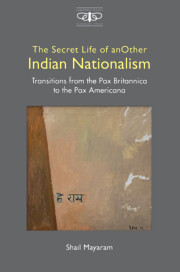 The Secret Life of Another Indian Nationalism
The Secret Life of Another Indian Nationalism Published online by Cambridge University Press: 11 February 2022
Even as Hindutva garners support through popular history and the modern idea of religion, it encounters its fiercest opposition from another religious language—that of spirit possession. Hindutva activists dismiss ideas relating to spirits as ‘superstition’. But among both Hindus and Muslims are beliefs and practices relating to spirits as inhabiting the cosmos and porous bodies. These constitute shared mythic spaces and, as I have argued elsewhere, are the basis of living together amid conflict, a humbler translation of cosmopolitanism. Sushila Rawat, healer of Husain Tekri, represents a larger phenomenon involving both multiple shamanisms and also medical pluralism.
Strangely enough Sudhir Kakar identified a Hindu–Muslim divide in the discourse of possession and argued that a Hindu is usually possessed by a Muslim bhūt, or malignant spirit. This is ironic as it was his seminal work on India's healing traditions that brought out diverse meanings and expressions of possession and exorcism. Kakar writes:
Possession by a Muslim bhuta, then, seemed to reflect the afflicted person's desperate efforts to convince himself and others that his hunger for forbidden foods and uncontrolled rage towards those who should be loved and respected, as well as all other imagined transgressions and sins of the heart, belonged to the Muslim destroyer of taboos and were furthest away from his ‘good’ Hindu self. In that Muslim bhutas were universally considered to be the strongest, vilest, the most malignant and the most stubborn of the evil spirits, the Muslim seemed to symbolize the alien and the demonic in the unconscious part of the Hindu mind.
In one of Kakar's case studies, a Brahman priest demanded to eat kababs during his trance. Kakar grants these the status of preconscious attitudes of Hindus towards Muslims. The communal imagination is well entrenched in childhood, he argues, although the drives continue to be suppressed. ‘Bhutna seems less an individual childhood anxiety than a collective fear of Indian Muslims.’
For me the following questions were salient. Are Hindus possessed predominantly by Muslim spirits? Do Hindu women betray sexual anxieties with respect to Muslim men? Does the discourse of spirit possession and exorcism suggest the otherness of the Muslim for the Hindu?
To save this book to your Kindle, first ensure [email protected] is added to your Approved Personal Document E-mail List under your Personal Document Settings on the Manage Your Content and Devices page of your Amazon account. Then enter the ‘name’ part of your Kindle email address below. Find out more about saving to your Kindle.
Note you can select to save to either the @free.kindle.com or @kindle.com variations. ‘@free.kindle.com’ emails are free but can only be saved to your device when it is connected to wi-fi. ‘@kindle.com’ emails can be delivered even when you are not connected to wi-fi, but note that service fees apply.
Find out more about the Kindle Personal Document Service.
To save content items to your account, please confirm that you agree to abide by our usage policies. If this is the first time you use this feature, you will be asked to authorise Cambridge Core to connect with your account. Find out more about saving content to Dropbox.
To save content items to your account, please confirm that you agree to abide by our usage policies. If this is the first time you use this feature, you will be asked to authorise Cambridge Core to connect with your account. Find out more about saving content to Google Drive.